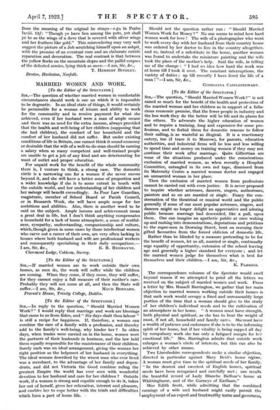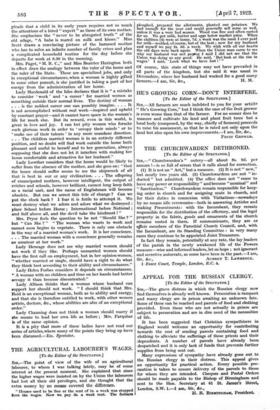[To the Editor of the SPECTATOR.]
Sia,—The question, "Should Married Women Work?" is not raised so much for the benefit of the health and protection of the married woman and her children as in support of a falla- cious economic premise, that the fewer people in industry and the less work they do the better will be life and its plums for the others. To advocate the higher education of women and to require a training, long and expensive, for some pro- fessions, and to forbid them for domestic reasons to follow their calling, is as wasteful as illogical. It is a reactionary outcry, too (I trace it to Moscow), for parents, education authorities, and industrial firms will be less and less willing to spend tune and money on training women if they may not continue their work after marriage. Quite Gilbertian arc some of the situations produced under the conscientious exclusion of married women, as when recently a Hospital Committee, entangled in its own red tape, dismissed from its Maternity Centre a married woman doctor and engaged an unmarried woman in her place.
Then the exclusion of married women from professions cannot be carried out with even justice. It is never proposed to inquire whether actresses, dancers, singers, authoresses, painters and so on are married or single. Fancy the con- sternation of the theatrical or musical world and the public generally if some of our most popular actresses, singers, and dancers might no longer delight an appreciative and adoring public because marriage had descended, like a pall, upon them. One can imagine an apathetic public at once waking up and rushing into demonstrations, deputations and petitions to the super-men in Downing Street, bent on rescuing their gifted favourites from the forced oblivion of domestic life.
Rather than be blinded by a measure pretending to be for the benefit of women, let us all, married or single, continually urge equality of opportunity, extension of the school leaving age and generally a higher standard for everyone ; and let the married women judge for themselves what is best for themselves and their children.—I am, Sir, &c., K. PARSONS.
The correspondence columns of the Spectator would swell beyond reason if we attempted to print all the letters we received on the subject of married women and work. From a letter by Mrs. Russell Barrington, we gather that her main objection to married women working outside their homes is that such work would occupy a fixed and unreasonably large portion of the time that a woman should give to the study of her children's individual needs and to the cultivation of an atmosphere in her home. "A woman must have strength, both physical and spiritual, as she has to bear the weight of most, if not all, household and family cares. She must have a wealth of patience and endurance if she is to be the informing spirit of her home, but if her vitality is being sapped all day by compulsory work she has only a fatigued margin for her emotional life." Mrs. Barrington admits that outside work enlarges a woman's circle of interests, but this can also be achieved by other means.
Two Lincolnshire correspondents make a similar objection, directed in particular against Mary Rcid's home regime.
A woman must give time to the spiritual needs of her family. "In the dearest and sweetest of English homes, spiritual needs have been recognized and carefully met ; one recalls the beautiful record of Lady Blanche Balfour's house at Whittinghame, and of the Gurneys of Earlham."
Miss Edith Scott, while admitting that the combined . earnings of a wife and husband might easily permit the employment of an expert and trustworthy nurse and governess,
pleads that a child in its early years requires not so much the attentions of a hired "expert " as those of its own mother.
She emphasizes the "never to be abrogated truth" of the old adage, "A babe is reared on milk and kisses." Miss Scott draws a convincing picture of the harassed mother who has to solve an infinite number of family crises and plan a complicated household routine for the day before she departs for work at 8.30 in the morning.
Mrs. Paget, "M. R. C.," and Miss Beatrice IIarington both in effect draw the analogy between the ruler of the home and the ruler of the State. These are specialized jobs, and only in exceptional circumstances, when a woman is highly gifted in some other pursuit, is she justified in taking a part of her energy from the administration of her home.
Lady Macdonald of the Isles declares that it is "a mistake to consider ' work ' and 'a career' for married women as something outside their normal lives. The destiny of woman . . . is the noblest career one can possibly imagine. . . . It is not accomplished without real work—inspired and upheld by constant prayer—and it cannot leave space in the woman's
life for much else. But its reward, even in this world, is _great in love and joy. I can but pity women who forsake
such glorious work in order to 'occupy their minds' or to make use of their talents' in any more mundane direction. . . . The childless married woman is in an entirely different position, and no doubt will find work outside the home both pleasant and useful to herself and to her generation, always supposing that she does not let it interfere with making her home comfortable and attractive for her husband."
Lady Lowther considers that the home would be likely to suffer from the absence of the mother, and she goes on: "that the home should suffer seems to me the shipwreck of all that is best in our or any civilization. . . . The offspring of emancipated mothers, however intelligent, the output of creches and schools, however brilliant, cannot long keep faith as a racial unit, and the name of Englishman will become obsolete. But can we arrest this tide of change ? Can we put the clock back ? I fear it is futile to attempt it. We must destroy what we adore and adore what we destroyed : place School before Home ; International before National ; and Self above all, and the devil take the hindmost ! "
Mrs. Pryor feels the question to be not "Should She ? " but "Can She ? " "The woman who wants to work and cannot soon begins to vegetate. There is only one obstacle in the way of a married woman's work. It is her conscience. . . . The married woman with a conscience generally remains an amateur at her work."
Lady Heneage does not see why married women should not work if they like. Perhaps unmarried women should have the first call on employment, but in her opinion women, "whether married or single, should have a right to do what they think best according to their ability and circumstances." Lady Helen Forbes considers it depends on circumstances. "A woman with no children and time on her hands had better occupy it than become discontented."
Lady Allison thinks that a woman whose husband can support her should not work. "I should think that Mrs.
Reid is an exceptional woman, both as to ability and energy, and that she is therefore entitled to work, with other women artists, doctors, &c., whose abilities are also of an exceptional order."
Lady Channing does not think a woman should marry if the means to lead her own life as before ; Mrs. Farquhar is of the same opinion.
It is a pity that more of these ladies have not read our series of articles, where many of the points they bring up have been discussed.—En. Spectator.











































 Previous page
Previous page